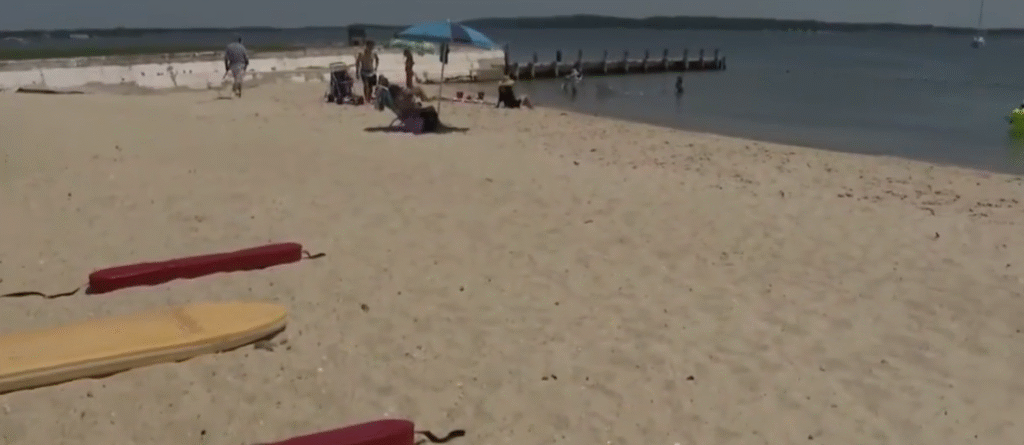The hero who saves a child only to be prosecuted for it, reads like a scene from an ironic screenplay. The lifeguard, a 23-year-old from New Canaan, Connecticut, was employed at Chelsea Piers, a busy sports complex renowned for its upscale patrons and family-friendly events. That day, his job was simple: keep an eye on a little splash pool full of summer campers. Instead, what transpired would put traditional ideas of accountability and fairness to the test.
Adam Khattak, age five, was involved in the incident; he slipped under the water for a number of minutes without anyone noticing. Later, video footage showed Stein pacing the pool’s edge and scanning it periodically before spotting the boy submerged. By then, more than four minutes had gone by, which seemed like an eternity to those who watched the video afterwards. In order to successfully revive Adam, Stein dove in, pulled him out, and performed cardiopulmonary resuscitation. One would think that the rescue should have been a cause for celebration. Rather, it became the primary cause of his arrest.
The 10-10 lifeguard rule, which is generally accepted to require a lifeguard to spot a swimmer in distress within ten seconds and reach them within ten more, was allegedly broken by Stein, according to the prosecution, who claimed that his delay amounted to “reckless endangerment.” Stein “failed miserably” at his duties, according to the Stamford State’s Attorney, who noted that he had passed the submerged child multiple times. “If he performs like that as a lifeguard, we are better off not having him as one,” said the court, presided over by Judge Gary White, echoing this frustration.
Profile: Zachary Stein – Lifeguard
| Field | Information |
|---|---|
| Name | Zachary Stein |
| Age | 23 at time of incident |
| Role | Full-time lifeguard at Chelsea Piers, Stamford, Connecticut |
| Incident | Rescue of 5-year-old child nearly drowned at pool |
| Date of Incident | August 3, 2017 |
| Legal Charges | Reckless endangerment and risk of injury to a child Connecticut Post+2CBS News+2 |
| Case Outcome | Accepted into diversionary program; charges set to be removed if successful Aquatics International+1 |
| Reference | https://www.stamfordadvocate.com/policereports/article/Lifeguard-to-get-diversionary-program-in-Stamford-12944425.php Stamford Advocate |

Under the leadership of lawyer Mark Sherman, Stein’s defense painted a strikingly different picture. He clarified that his client was carrying out his responsibilities while briefly missing what was heartbreakingly difficult to observe, rather than being sidetracked by personal pursuits or carelessness—he was not texting, chatting, or relaxing. Experts point out that drowning is frequently silent and subtle. Instead of flailing or screaming, victims move silently beneath the surface, and their actions are frequently confused with play. This physiological fact, which demonstrated how quickly such crises can develop, became crucial to Stein’s defense.
Even the child’s family acknowledged Stein’s attempt to save their son in spite of the conflict in the courtroom. William Bloss, their lawyer, attested that the family supported Stein’s enrollment in a diversionary program and valued his attempt to save his life. It’s encouraging and ironic that Adam survived without any long-term harm considering the ensuing legal issues. However, his parents later sued for compensation in a civil suit, claiming long-term trauma and medical costs. This dichotomy—appreciation combined with litigation—perfectly captures how bureaucracy is frequently used in modern society to reward bravery.
The incident sparked widespread indignation. Disbelief erupted on social media, which portrayed the case as a hideous misrepresentation of justice. Thousands of comments flooded Facebook discussions and Reddit threads denouncing the state’s decision to prosecute and the parents’ decision to sue. “The same kind of parents who drop their kids off at a pool unsupervised are the ones who call the police when they’re saved,” joked one widely shared post. This sentiment, which reflected growing dissatisfaction with a culture that was becoming more punitive, struck a chord with online communities.
A deeper social tension was also brought to light by Stein’s case: the decreasing tolerance for human error among those in charge of public safety. Lifeguards are subject to intense scrutiny, much like physicians who are sued for malpractice or educators who are charged with carelessness. Their job necessitates excellence in situations that are inherently flawed. Constant vigilance is thwarted by splashing distractions, sunlight glare, and the unpredictable nature of human behavior. However, when tragedy occurs, the demand for perfection is used as a weapon in court.
This paradox reflects more general discussions concerning empathy versus accountability. It brings to mind instances of first responders who, despite acting in good faith, were sued—firefighters sued for water damage after rescues, paramedics charged after traffic delays. Every case weakens the resolve of common heroes to take decisive action. The chilling effect is especially concerning. “If saving someone can get you arrested, who’s going to step forward next time?” a former lifeguard wrote on the internet. That question looms large, portending a time when instinct will be replaced by hesitation.
It is impossible to ignore Stein’s own psychological effects. He was once a self-assured young athlete who wanted to work in sports management, but his options for a career were drastically reduced. His probation prohibited him from working in any lifeguard-related capacity. However, his story also serves as a warning—not about negligence, but about the unachievably high expectations placed on those who are responsible for protecting others. It demonstrates how easily, in a legal culture that occasionally conflates accountability with retaliation, heroism can be reframed as liability.
It’s interesting to note that this story is consistent with similar disputes in entertainment and celebrity culture, where public figures are criticized for actions that were once deemed admirable. The moral compass of society appears to be becoming more reactive, as evidenced by the actors who break up street fights and the athletes who are punished for their bravery off the field. This contemporary dichotomy, in which procedure and perception are just as important as result, is where Stein’s experience fits in well.

